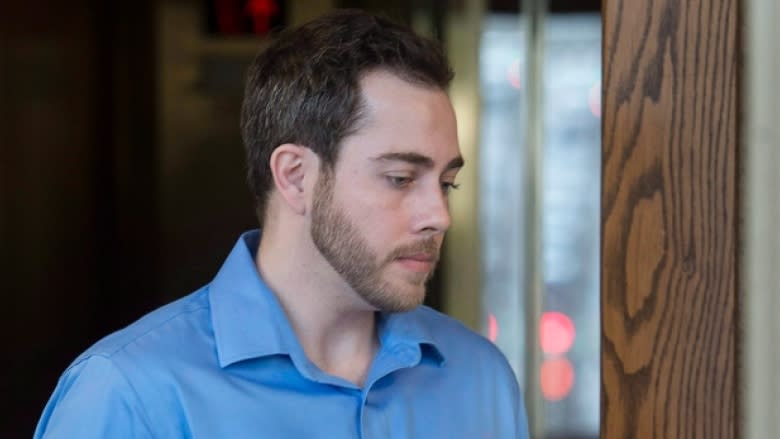Christopher Garnier in court to have parole timelines decided
A justice of the Nova Scotia Supreme Court must now decide how much time convicted murderer Christopher Garnier must spend in prison before he can begin applying for parole.
Garnier, 30, was convicted in December of second-degree murder and interfering with a dead body in the 2015 death of 36-year-old Catherine Campbell.
Campbell's body was found under Halifax's Angus L. Macdonald Bridge three days after she failed to report for her job as a constable with the Truro, N.S., police force.
On Monday, Justice Josh Arnold heard arguments on Garnier's parole ineligibility. His lawyer, Joel Pink, asked Arnold to consider the minimum term allowed under law — 10 years. Crown prosecutor Christine Driscoll argued that 16 years was a more appropriate prison term.
A jury found that Garnier strangled Campbell and used a compost bin to dump her body near the bridge on Sept. 11, 2015, after the pair met at a Halifax bar.
Mental illness should be considered, lawyer argues
In submissions filed with the court, defence lawyer Joel Pink said his client was diagnosed with post-traumatic stress disorder caused by the murder itself. As a result, Pink wanted his client's mental illness to be considered a factor in parole eligibility.
In court, Driscoll described that use of PTSD as "perverse."
"I did use that term. I think it's an appropriate term," Driscoll said outside court.
However, Pink modified his position Monday, arguing that Garnier's mental illness should influence which prison he is sent to rather than his term of parole ineligibility.
Pink said he has concerns about whether Garnier can get the proper treatment for his mental health at the maximum-security prison in Renous, N.B. He suggested the medium-security prison in Springhill, N.S., would be a better choice.
However, Arnold can only make recommendations; he cannot order that Garnier be sent to a particular institution.
Pink said Garnier should be on the lower end of the parole ineligibility spectrum because he has been described as a "kind, caring person" who has shown remorse for the killing, which Garnier has argued happened accidentally during rough sex. The lawyer also included 31 letters of support from friends and family.
The Crown challenged the uniformly positive tone of the letters from Garnier's family and friends, saying none of them acknowledged he had any mental health issues prior to the murder. Evidence at his trial showed Garnier had been using his father's antidepressants.
Victim impact statements
Members of Campbell's family gave emotional victim impact statements during Monday's hearing.
Her mother, Susan, spoke while her father Dwight stood beside her, holding a photo of his murdered daughter. Susan Campbell listed all the milestone events she and her husband won't get to share with their daughter, including a wedding and grandchildren. Campbell said when her daughter died, a piece of them died as well.
In her statement, Campbell's sister Amy Garneau said her five-year-old daughter is often afraid to go out because she fears the "bad man" who killed her aunt will get her. Garneau said, however, that her daughter wants to be a police officer just like Campbell.
Arnold will rule on parole ineligibility on Tuesday.
CBC reporter Blair Rhodes live blogged from today's hearing.


